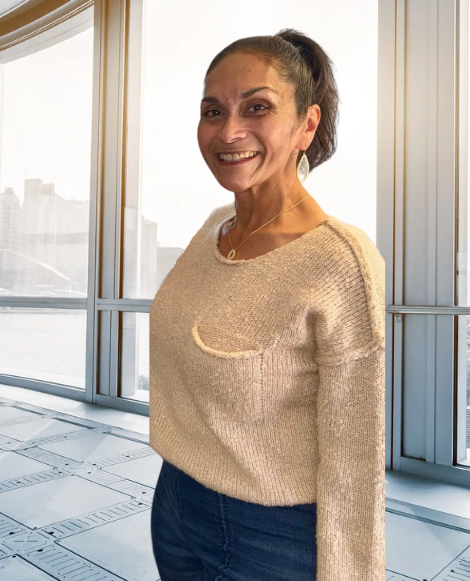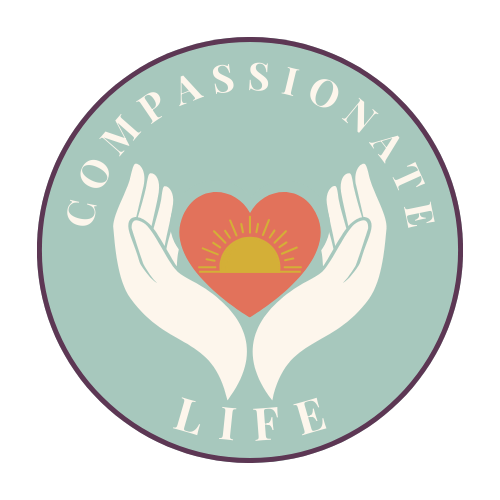Curious to learn more?
Here’s some Q&A’s about us and our process:


Who We Are
1. What inspired you to start Compassionate Life?
I created Compassionate Life to give people a safe space to heal, recover, and grow. Whether you’re facing personal struggles, relationship challenges, or business obstacles, I truly believe that with compassionate support every step of the way, everyone can thrive. My goal is to walk beside you as you work toward becoming the best version of yourself.
2. What makes Compassionate Life different?
Compassionate Life is different because we don’t compare ourselves to anyone else and we don’t compete with anyone else either. We are here to focus on our clients and the support we can provide to them to get to a place of happiness and comfort. What also sets us apart is we only coach on experiences we have experience with. I know we are not a fit for everyone and not everyone is a fit for us.
3. What does the name ‘Compassionate Life’ mean to you?
To me, a “Compassionate Life” means leading with empathy, making space for healing, and choosing growth every single day. It’s about meeting people where they are, offering support without judgment, and helping them find peace, clarity, and confidence in who they are now, who they will be during our process and who they will become!
4. What is your approach to coaching?
My style is open, honest, and always rooted in compassion. I coach from real-life experiences—I’ve faced many of the same struggles I now help others overcome. I create a safe, judgment-free space where clients can share openly and begin to heal. Through personalized tools, encouragement, and consistent accountability, I guide clients to tap into the strength and transformation that already lives within them.
About Our Services
5. What types of coaching do you offer at Compassionate Life?
I work with individuals, couples, and groups, supporting them through challenges such as anxiety, depression, abuse recovery, and relationship difficulties. I also provide pre-marital coaching, and for couples who choose to take that next step, I have the honor of officiating their weddings, yes, I’m ordained to marry couples!
For business owners, I offer support to help strengthen team dynamics, improve operational flow, and develop leadership strategies that drive growth and success and most importantly team members that feel valued and heard.
6. Who do you work with—individuals, couples, groups, business owners?
I work with individuals, couples, families, groups, and business owners. Couples can be married or unmarried, and groups may include families, extended families, blended families, or teams within a business. Whether someone is seeking personal healing or professional development, my role is to support and guide their growth with compassion and purpose.
7. Can you explain what recovery coaching is and who it can help?
Recovery coaching is about walking alongside someone who’s healing from substance use, trauma, or a major life shift. I help clients identify their triggers, strengthen their support systems, and stay accountable to their goals. Recovery looks different for everyone, and my role is to meet each person where they are and help them move forward with understanding and compassion.
8. How do you support clients dealing with anxiety, depression, or relationship conflict?
First and foremost, I let every client know that this is a judgment-free space. Building trust and connection is the foundation, so clients can feel safe to be honest, open, and vulnerable. I understand that no two people are alike, so I create personalized action plans using different tools and techniques tailored to each individual. We focus on identifying triggers and using practical communication strategies and reflective exercises to help clients feel more in control of their emotions, relationships, and overall life direction.
9. What’s the difference between life coaching and therapy?
Therapy often focuses on the past and diagnosing mental health conditions, while coaching is current – future-focused and action-oriented. I don’t diagnose or treat—I guide and provide the knowledge and the tools to help yourself in the future. Coaching is about setting goals, building new habits, and finding the next right steps. It’s a partnership that encourages growth through identifying, accountability, support and especially compassion.
Coaching Businesses
10. You also coach business owners — what does that involve?
My business coaching focuses on supporting entrepreneurs and small to medium sized teams strengthen their internal communication, leadership, and customer service. I help identify gaps in operations, develop team structures, and create sustainable systems that allow teams to thrive.
11. How does your background in customer service and operations influence your business coaching style?
With over 35 years of experience in customer service, training, quality assurance and leadership, I understand the day-to-day pressures teams face. I bring a practical, solutions-focused approach to every session—offering real strategies that boost morale, improve efficiency, and align teams with company goals.
What to Expect When Getting Started
12. What can someone expect during our interview?
The first step in working with me is a simple interview. This is where we figure out if we’re a good fit—can I support you in the way you need, and are you in a place to accept that support? From there, we move on to a full consultation where we dive deeper into your goals and challenges. If it feels like the right path for you, we’ll move forward with beginning your coaching journey together.
13. How can someone get started with you or learn more about your services?
You can visit my website and click the “How to Get Started” link at the top of the page. From there, you can schedule an interview so we can talk about what you’re going through and determine if we’re a good fit. To learn more about our services you can click on the “Learn More” tab on our website.
14. What’s your coaching style like — are you more structured, casual, hands-on?
I’d describe my style as warm, real, and hands-on. I guide with compassion, but I also believe in holding people accountable to their goals. I meet clients where they are and offer structure and flexibility depending on their unique needs and dedication.
15. Do you offer virtual sessions or just in person?
I offer both virtual and in-person sessions for individuals, couples, groups, and businesses. I want to make sure everyone has access to the support they need, no matter where they are. I’m based in Texas and available to meet locally, but I also work with clients virtually to meet broader needs and provide flexibility for all.
Philosophy & Impact
16. What’s one thing you hope every client walks away with after working with you?
There are several things I hope each client walks away with after working with me. I want them to leave feeling stronger, more hopeful, and more connected to who they are at their core. I hope they gain tools they can continue using every day to support themselves, along with the belief that they are fully capable of living a life aligned with peace and purpose. And most importantly, I want them to know that compassionate, caring people still exist—people who truly want to listen, support, and walk with them.
17. Why do you believe compassion is such an important part of healing and growth?
Because healing doesn’t happen in harsh environments. Compassion allows us to tell the truth, confront the hard stuff, and still feel worthy of love and change. When we feel safe and supported, growth becomes not only possible — it becomes inevitable.
18. How do you measure success with your clients?
Success looks different for each person. Sometimes it’s a mindset shift, sometimes it’s a bold action. I measure success by progress, not perfection—when clients feel more confident, more in control, and more aligned with their values, that’s success.
19. What has been one of your most memorable coaching experiences so far?
One of my favorite experiences was walking a couple through premarital coaching. During our sessions, they realized there were important things they hadn’t discussed yet, and together we created space for those deeper conversations. They grew in trust and communication and later asked me to officiate their wedding. Moments like that—witnessing growth, love, and connection—are a reminder that this work is not only meaningful, but also a blessing.
In Closing
20. If someone is unsure about coaching, what would you say to encourage them to give it a try?
No one has it all figured out—and that’s okay. Taking the first step is about exploring possibilities. Let the interview be a chance to simply talk and see how it feels. The consultation gives you a deeper look into what coaching could be for you. Think of this as an investment in your future—in the person you’re becoming, even if you’re still getting to know who that is. The most important relationship you’ll ever have is the one with yourself. And whether or not we move forward, you’ll always be met with compassion, patience, and understanding here.
21. What’s your vision for the future of Compassionate Life?
My vision is to expand my services both locally and online—offering coaching, workshops, and community support that reaches people in every stage of life. I’d love to host retreats, collaborate with other coaches, and continue creating safe, powerful spaces for healing and growth.
22. How can the community support you as a new local business?
Support can look like sharing my name, referring a friend, attending a workshop, or even following and engaging on social media. Every kind word and connection makes a difference. I’m here to serve this community, and I’m grateful for the opportunity to grow together.
